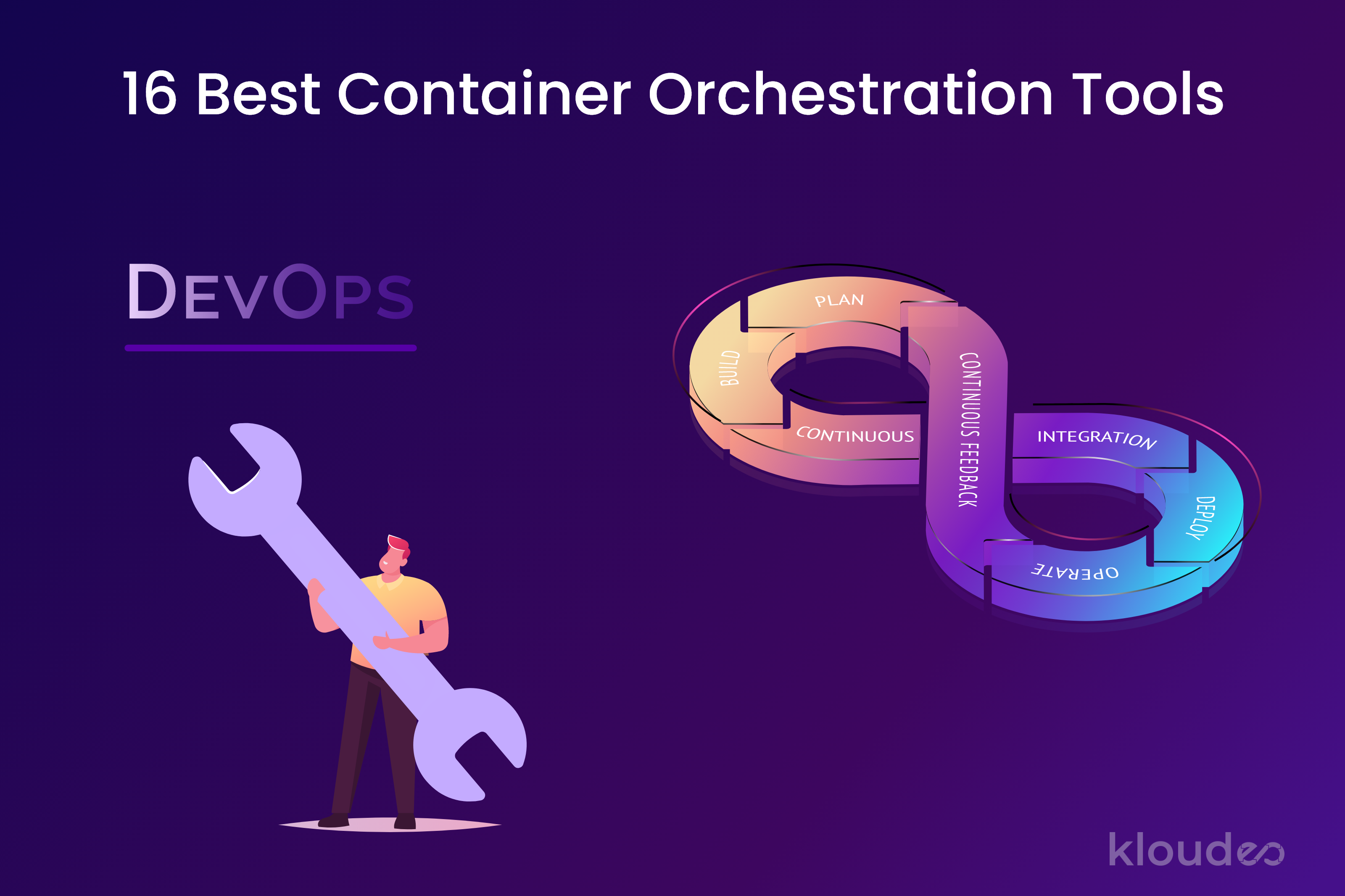Are you looking to streamline and automate container deployment, scaling, and management in the cloud? Look no further! The container orchestration tools are the best option for achieving a more efficient and effective container infrastructure.
Container orchestration platforms like Docker, Podman, and Buildah offer great versatility in containerizing and transferring application code. However, when it comes to complex application deployment and infrastructure automation, a suitable container orchestration tool is a must. Your containerized applications must be able to adjust their capacity based on resource needs. An efficient framework for managing containers is required to ensure optimal performance.
What Is A Container In Cloud Computing?
A container is a standard unit of software that packages up code and all its dependencies. In addition, container orchestration tools are used, so the application runs quickly and reliably from one computing environment to another. In cloud computing, containers are used to deploy and run applications in a scalable and efficient manner.
Whether you’re just starting with containers or are a seasoned veteran, there’s sure to be an option that fits your needs. From open-source solutions to enterprise-grade offerings, these tools offer robust features, ease of use, and a proven track record of success.
How Do Containers Work?
Containers pack an application and its dependencies into a single, isolated unit. This unit can then be run consistently across different computing environments, making it easier to deploy, manage, and scale applications by leveraging the host OS’s features and capabilities.
Here are the key points about how containers work:
- Isolation: Containers provide an isolated environment for applications and their dependencies, ensuring they run smoothly across different environments
- Portability: Containers can be moved from one system to another, making it viable to deploy and manage applications
- Resource sharing: Containers share the host system’s resources, such as the operating system kernel, making them more efficient and lighter than virtual machines
- Image-based deployment: Containers are deployed using prebuilt images, making it faster and easier to get started with containerization
- Efficient use of resources: Containers only include the necessary components, reducing the size of the deployed application and minimizing resource usage.
By leveraging the benefits of containerization, companies can streamline their application deployment, management, and scaling processes, reducing costs and increasing efficiency.
How Does Container Orchestration Work?
Container orchestration is the process of automating the deployment, scaling, and management of containers in a multi-container application. Many container orchestration tools are used for this purpose.
The key components of a container orchestration system are:
Cluster management: A cluster of nodes that run the containers, managed by a central control plane.
Scheduling: Automatically placing containers on available nodes based on resource requirements and constraints.
Load balancing: Automatically distributing incoming traffic across multiple containers.
Service discovery: Automatically detecting containers’ IP addresses and ports and updating the network configuration accordingly.
Configuration management: Storing and updating configuration information, such as environment variables, secrets, resource requests, and limits, in a central repository.
What are the best Container Orchestration Tools?
So, without further ado, let’s dive into the best container orchestration tools in 2023.
Kubernetes
Kubernetes is an open-source platform for automating highly available containers efficiently. It helps organizations to manage their containerized workloads and services. Additionally, DevOps teams efficiently use Kubernetes cluster to provide a unified way of deploying, scaling, and operating applications in a cloud-native environment.
Key Features
- Automated deployment and scaling
- Self-healing
- Load balancing
- Namespaces for multi-tenancy
- Resource management and optimization
- Service discovery and load balancing
- Storage orchestration
- Automated rollouts and rollbacks
- Batch execution
- Horizontal scaling of stateless applications
According to a study by Datadog on the adoption of Kubernetes in organizations, nearly 90% of Kubernetes users take advantage of cloud-managed services.
Kubernetes is a highly flexible and scalable platform that provides businesses with efficient ways to manage their containerized workloads. The high-level architecture enables businesses to stay competitive in today’s rapidly changing business environment. With its large and growing community, Kubernetes is constantly evolving and adding new features to meet the evolving needs of businesses.
Redhat Open Shift
Openshift is a leading container orchestration platform that provides a complete solution for deploying, scaling, and managing containerized applications. As a container orchestration tool, Openshift offers businesses a unified way to automate their container management processes and streamline their operations.
Key Features
- Automated deployment
- Load balancing
- Multi-tenancy
- Resource management and optimization
- Automated rollouts and rollbacks
- Batch execution
- Storage orchestration
- Service discovery and load balancing
Openshift provides businesses with an automated solution for rollouts and rollbacks, allowing them to manage their application updates controlled and efficiently. Also, it is available on managed services on the AWS cloud. With its advanced features and ease of use, Openshift is an ideal choice for businesses to streamline their operations.
HashiCorp Nomad
Hashicorp Nomad is a potent orchestration platform that supports the running of multiple containers. As a result, Nomad is the ideal choice for businesses of all sizes looking to modernize infrastructure, streamline operations, or increase agility.
Key Features
- Multi-Cloud support
- Automated deployment and scaling
- Native integration with HashiCorp Tools
- Real-time visibility and analytics
- Flexible resource management
- Batch and scheduling
Nomad automates the deployment of containers and ensures that they are running optimally at all times. Also, it is natively integrated with other Hashicorp tools, such as Vault and Consul.
Docker Swarm
The Docker ecosystem provides businesses with a comprehensive solution for deploying, managing, and scaling their containerized applications. By combining the use of Docker-compose, swarm, an overlay network, and a top-notch service discovery tool such as Consul, it’s possible to manage clusters in Docker containers effectively.
Key Features
- Native integration with Docker tools
- Advanced security features
- Real-time visibility and analytics
- Advanced lifecycle management
- Automated deployment and scaling
Docker Swarm is natively integrated with other Docker tools, such as Docker Compose and Docker Machine. This advantage of Docker Swarm allows businesses to leverage additional management and automation capabilities. Although Docker Swarm is still developing its feature set compared to other open-source container orchestration tools, it has the potential to catch up with its large community of contributors quickly.
Ranchers
It is an open-source container orchestration tool. The advanced tool uses Kubernetes as the container orchestrator.
Key Features
- Streamline Kubernetes operations
- Integrated monitoring and logging
- Customizable workflows
- Automated deployment and scaling
- Global application catalog
- Advanced networking
Rancher is a comprehensive container orchestration platform that provides businesses with a streamlined and scalable solution for managing containers.
Apache Mesos
Mesos is a potent cluster management tool with a centralized approach to managing workloads in distributed environments. Twitter first created it for its infrastructure but it later became open source.
Key Features
- Load balancing
- Consistent data distribution
- Resource isolation
- Efficient resource allocation
While Mesos does not have native support for service discovery, it is compatible with applications that support Kubernetes and Docker. Additionally, Apache Mesos is a suitable solution for businesses looking to optimize their computing resources with its ability to manage large-scale, clustered applications. The efficient Marathon framework effectively deploys and manages containers on a Mesos cluster.
Managed Container Orchestration Tools: The Future of Container Deployment
In recent years, containers have become essential in software development, testing, and deployment. A container is a standalone executable package, an ideal solution for deploying applications consistently and reliably across different environments.
What are Managed Container Orchestration Tools?
Managed container orchestration tools are cloud-based platforms that provide a centralized solution for deploying, managing, and scaling containers. They provide a single platform to manage containers across multiple hosts, automate the deployment of containers, and provide automatic scaling based on demand. Here is the list of the top 10 container-managed services.
Google Kubernetes Service (GKE)
The Google cloud platform’s managed container orchestration tool is a framework to deploy, manage and scale containerized apps. GKE is built on top of the Kubernetes open-source container orchestration system and provides a scalable and reliable solution for container deployment.
Key Features Of GKE
- Serverless Kubernetes experience on autopilot
- Container-native networking and security
- Prebuilt Kubernetes applications & templates
With its integration with GCP, ease of use, and built-in security features, GKE provides a reliable and cost-effective solution for container deployment.
Google Cloud Run
Cloud run is a serverless managed service to run containers on the Google cloud platform. With automatic scaling, you don’t have to manage container clusters alone. Google Cloud will aptly scale and manage it.
Key Features Of Cloud Run
- Unique HTTPS endpoint for every service
- Fast request-based auto-scaling
- Built-in traffic management
- Leverage container workflows and standards
- Pay‐per‐use pricing for services
With the help of Google Cloud Run, you can build and deploy containerized applications in any language.
Amazon EC2 Container Service (ECS)
ECS is a comprehensive and scalable container orchestration solution. This service is not based on the Kubernetes service. Instead, it provides an easy way to deploy and manage containers on the Amazon Web Services (AWS) cloud platform.
Key Features Of AWS ECS
- Aptly manage on-premises container workloads
- Serverless by default with AWS Fargate
- Security and isolation by design
- Autonomous control plane operations
It natively integrates with AWS and third-party tools to make it easier for teams to focus on building the applications, not the environment.
AWS Elastic Kubernetes Service (EKS)
EKS is a managed Kubernetes platform that provides an easy and efficient way to deploy and scale applications on Amazon Web Services. This service is similar to GKE.
Key Features Of EKS
- Managed Kubernetes clusters
- Cost monitoring
- Logging
- Managed cluster update
- Load balancing
- Network and security
- Advanced workload support
AWS EKS provides a simple user interface that makes deploying and managing Kubernetes clusters easy. With AWS EKS, you can deploy applications with a few clicks, and the platform will take care of the rest.
AWS Fargate
AWS Fargate is a serverless container compute engine with Amazon ECS and EKS.
Key Features Of AWS Fargate
- Simplifies the deployment process
- Removes operational overhead of scaling
- Compute engine for containers
- Integrated with Amazon ECS and Amazon EKS
AWS Fargate pay -as -you go compute engine focuses entirely on building and managing applications.
Azure AKS Service
Azure Kubernetes Service(AKS) is Microsoft’s managed Kubernetes service, enabling developers to easily deploy, manage, and scale containerized applications. With Azure AKS Service, users can focus on developing and deploying their applications while Microsoft handles the underlying infrastructure.
Key Features Of Azure AKS Service
- Build and scale with Kubernetes
- Easy deployment
- Store and manage container images
- Azure Kubernetes fleet manager
This service reduces the operational overhead and allows users to get their applications to market faster.
Azure Managed Openshift Service
This service provides highly available open shift clusters managed jointly by the effort of Microsoft and Redhat.
Key Features Of Azure Managed OpenShift Service
- Simplified deployment
- Container portability
- Integration with Azure services
- Enterprise-grade security
- Edge architecture support
By using Azure Managed OpenShift Service, enterprises can take advantage of the benefits of OpenShift and Kubernetes while also leveraging the scale and reliability of the Azure cloud.
Azure Container Instances (ACI)
ACI is the simplest way to run containers. However, while container orchestration tools like Kubernetes are powerful, they are difficult to manage. That’s where Azure Container Instances comes in.
Key Features Of Azure Container Instances
- Support for both Windows and Linux container
- Fast and easy deployment
- High availability
- Automatically scale compute resources
So, if you’re looking for a simple and effective way to run containers, look no further than Azure Container Instance. This service provides several application–specific capabilities such as scaling , revisions, and much more. Hire Microsoft Cloud Engineers for full-fledge cloud services.
Mirantis Kubernetes Engine(MKE)
MKE is a managed Kubernetes service offered by Mirantis, a cloud infrastructure solutions provider. MKE provides a platform for deploying and managing containerized applications in the cloud, leveraging the power of Kubernetes.
Key Features of Mirantis Kubernetes Engine
- Auto-scaling
- Resilience and self-healing
- Persistent storage
- DevSecOps support
With its simplified deployment and robust management and monitoring features, MKE is a powerful tool for deploying and managing containerized applications in the cloud.
Linode Kubernetes Engine(LKE)
This advanced container orchestration tool offers a fully managed solution in the cloud. It is an efficient platform for microservices and containerized applications that can be easily set up and administered.
Key Features of LKE
- Hourly billing for compute and storage
- Free control panel
- Configure horizontal autoscaler
- High availability
Like many modern container orchestration tools, it will help manage containerized applications. It utilizes Kubernetes as its foundation and can integrate with various Kubernetes-compatible tools, such as Rancher, Helm Charts, and Operators.
The Benefits Of Container Orchestration
Container orchestration provides several benefits for enterprises looking to deploy and manage applications.
- Improved resource utilization: Container orchestration tools can optimize the utilization of resources in the cluster, ensuring that applications are deployed efficiently and effectively.
- Scalability: Container orchestration makes it easy to scale applications up or down as needed without manual intervention.
- Improved resiliency: Container orchestration automates the deployment and management of multiple replicas of applications, ensuring that applications are highly available even in the event of failure.
- Portability: Container orchestration automates and makes deploying and managing applications on multiple cloud providers and on-premises environments easy
- Management: Container orchestration provides centralized monitoring, making it easier to keep track of the status of applications and resources in the cluster.
Major cloud providers offer fully managed services, making it easy for enterprises to take advantage of the benefits of container orchestration. With these services, enterprises can benefit from the power of Kubernetes without the need for complex setup and administration. By using container orchestration, enterprises can achieve improved resource utilization, scalability, resiliency, portability, and management of containerized applications, leading to increased efficiency and productivity.
Containers vs. Microservices
Containers and microservices are two related technologies in the field of cloud computing, but they serve different purposes and have distinct characteristics.Here are the key differences between containers and microservices:
- Purpose: Containers are a technology for packaging and running applications, while microservices are an architectural style for building and deploying applications.
- Scale: Microservices are designed to allow for independent scaling of individual services, while containers provide a way to package and run applications in a scalable manner.
- Flexibility: Microservices allow for flexible development and deployment, as individual services can be developed, tested, and deployed independently. Containers provide a way to package and run applications consistently.
- Complexity: Microservices can introduce additional complexity as the application is divided into multiple independent services linked with each other. Containers simplify deployment and management, as applications are packaged and run as a single unit.
By combining the benefits of containers and microservices, companies can build, deploy, and manage scalable and flexible applications in the cloud.
FAQs
What Are The Container Orchestration Tools?
Container orchestration tools provide a complete framework for managing containers and microservices and scaling the production environment. Many container orchestration tools are used for managing containers across multiple hosts. In addition, these tools allow companies to manage large-scale container deployments, ensuring that applications are deployed and run consistently and reliably in production environments.
What Are Orchestration Tools In DevOps?
DevOps orchestration is an automation process that manages various tasks involved in software development. These tools help organizations to streamline their development and deployment workflows, increase efficiency, and improve the overall quality of their applications. Here is a list of some popular orchestration tools in DevOps.
Ansible: An open-source platform for automating software provisioning, configuration management, and application deployment.
Puppet: A tool for automating infrastructure management and configuration.
Chef: An open-source tool for automating infrastructure management and configuration.
Jenkins: An open-source tool for automating continuous integration and continuous delivery (CI/CD) workflows.
Terraform: An open-source tool for automating infrastructure provisioning and management.
GitLab: An all-in-one platform for software development that provides version control, CI/CD, and other tools for DevOps.
What Are The Most Popular Container Orchestration Tools Used In 2022?
Enterprises looking for container orchestration tools will have various options to choose from a long list of tools. Here are some of the most popular and widely used container orchestration tools:
- Kubernetes: The most widely used and well-established container orchestration platform, Kubernetes is an open-source tool that provides robust and scalable management of containerized applications.
- Docker Swarm: A native clustering solution for Docker, Docker Swarm provides a simple way to manage and orchestrate containers.
- AWS Elastic Container Service (ECS): A fully-managed service provided by Amazon Web Services, ECS makes it easy for enterprises to run and manage containers on the AWS cloud.
- OpenShift: An open-source platform, OpenShift provides a complete solution for building, deploying, and managing containerized applications in production.
- Azure Container Instances (ACI): A fully-managed service provided by Microsoft Azure, ACI makes it easy for enterprises to run containers on the Azure cloud.
- Google Kubernetes Engine (GKE): A fully-managed service provided by Google Cloud Platform, to easily deploy, manage, and scale containerized applications on the Google cloud.
Whether you are looking for a cloud-based solution or an open-source platform, choose the best container orchestration tool that fit your business needs.
Conclusion
In a nutshell, container orchestration tools and services play a crucial role in container lifecycle management. With a large selection of tools from the Cloud Native Computing Foundation, managing containerized applications has become more accessible.
These tools offer many features and benefits, including improved resource utilization, scalability, resiliency, portability, and centralized management. In addition, by choosing the right container orchestration service, enterprises can achieve greater efficiency by decreasing production workloads.




